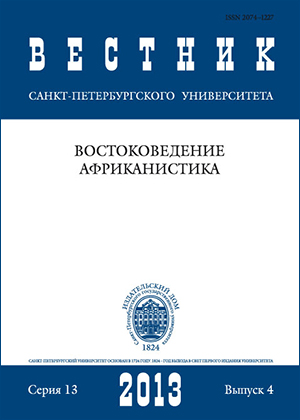Character portrayal in Chinese novels of the 1950s: the Party Loyalist vs. the Bourgeois Anti-Hero
Abstract
The article examines several novels from the early Communist period in China (“The Story of New Heroic Sons And Daughters” (1949), “The Song of Youth” (1958), “Bitter Herb” (1958) and “Morning in Shanghai” (1958)) and the potential of their protagonists to form healthy emotional attachments. The novels focus on depicting peasants and workers who try to overcome feudal way of thinking and be proactive in building their own happy lives. The novel “The Song of Youth” celebrates the revolutionary spirits of young intellectuals in big cities. The novel “Morning in Shanghai” depicts workers of the cotton mill in contrast to its owners — businessmen and bankers. While the authors of these novels do their best to make the Communist ideal of “comradeship” look attractive, they succeed only in creating one character after another with the same psychopathology. These “ideal” citizens are incapable of either erotic or parental love, and are not afraid of private loss or even death. Love between party loyalists is always and everywhere a function of the social body and of the wider responsibilities of the individual to that body — in short, of the Communist project to “unite” China — and never of individual idiosyncrasies; love between individual human beings is never allowed to trump the primacy of sacrifice in the name of the revolution or even to become a microcosm of the revolutionary spirit. While the abstract monomania of the model Communists leaves them incapable of the kinds of local attachment on which true humanity depends, the bourgeois villains depicted in these novels are all unique in their passions — for women, money, power and so on — and in their all-too-human, complex, contradictory ways seem more like real people to the modern reader. Refs 10.
Keywords:
Chinese literature, literary character, CPC, ideology
Downloads
References
Downloads
Published
How to Cite
Issue
Section
License
Articles of "Vestnik of Saint Petersburg University. Asian and African Studies" are open access distributed under the terms of the License Agreement with Saint Petersburg State University, which permits to the authors unrestricted distribution and self-archiving free of charge.





